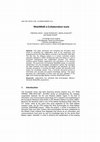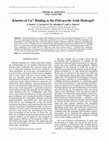Papers by Jelena Jovanovic
Proceedings of the 4th International Conference on Practical Aspects of Knowledge Management, 2002
D. Karagiannis and U. Reimer (Eds.): PAKM 2002, LNAI 2569, pp. 525-536, 2002. © Springer-Verlag B... more D. Karagiannis and U. Reimer (Eds.): PAKM 2002, LNAI 2569, pp. 525-536, 2002. © Springer-Verlag Berlin Heidelberg 2002 ... A Generic Framework for Web-Based Intelligent ... Vladimir Simeunović, Jelena Jovanović, Milan Sarić, and Sanja Vranes
Intelligent Learning Extended Organization (IntelLEO) is a new paradigm in learning communities. ... more Intelligent Learning Extended Organization (IntelLEO) is a new paradigm in learning communities. It represents a community that emerges as a temporal integration of two or more different business and educational communities and organizational cultures (industrial, research, and educational). The concept of IntelLEO is going to be investigated in a 3-year R&D project accepted for funding within the EU Seventh Framework Programme (FP7) and starting in early 2009. The project involves 8 partner institutions from Europe (both university/research and industry) and one from Canada. This paper presents the innovative concept of IntelLEO from the business case, technical, and pedagogical perspectives.
The International Review of Research in Open and Distributed Learning, 2008
Sixth IEEE International Conference on Advanced Learning Technologies (ICALT'06), 2006
The paper presents an ontology-based framework for capturing learning context related information... more The paper presents an ontology-based framework for capturing learning context related information important for personalization of both learning objects (LOs) and learning designs (LDs). The central part of the framework is the LO Context ontology, that bridges a learning content ontology and a LD ontology. The LO context ontology is aimed at capturing information about the actual usage of a LO inside a LD, such as the learning activity the LO was used in, the pedagogical role assumed by the LO (e.g. exercise), the learner's features (represented in the form of the learner model) and the like. Furthermore we suggest the architecture of an adaptive educational system that leverages the proposed approach to enable personalization and reuse of LOs and LDs.
For a successful learning organization, it is of crucial importance to have successful methods fo... more For a successful learning organization, it is of crucial importance to have successful methods for stimulation and sharing of working and learning activities of their employees. However, there are two important challenges to be addressed: i) combination of individual and organizational incentives that motivate employees to take part in knowledge building and sharing activities; and ii) structuring of learning and knowledge building activities and their outcomes in a representation that can assure unambiguous knowledge sharing.
Lecture Notes in Computer Science, 2011
This paper describes an innovative motivational approach combined with new tools to support self-... more This paper describes an innovative motivational approach combined with new tools to support self-regulated learners, stressing the importance of social embeddedness and collaboration for learners at work. We suggest that the social context plays an important role when it comes to defining learning goals, adapting one's strategies to social norms, and collaboratively creating knowledge with colleagues and peers. A first assessment of this motivational approach and early prototypes was conducted within the IntelLEO project by ...
Lecture Notes in Computer Science, 2002
D. Karagiannis and U. Reimer (Eds.): PAKM 2002, LNAI 2569, pp. 525-536, 2002. © Springer-Verlag B... more D. Karagiannis and U. Reimer (Eds.): PAKM 2002, LNAI 2569, pp. 525-536, 2002. © Springer-Verlag Berlin Heidelberg 2002 ... A Generic Framework for Web-Based Intelligent ... Vladimir Simeunović, Jelena Jovanović, Milan Sarić, and Sanja Vranes
Lecture Notes in Computer Science, 2006
This paper presents an ontology-based framework aimed at explicitly representing the context of t... more This paper presents an ontology-based framework aimed at explicitly representing the context of the use of a learning object inside of a learning design. The core of the proposed framework is a learning object context ontology that leverages a range of other kinds of learning ontologies (e.g. domain, user modeling, learning design etc.) to capture the context-specific metadata. On top of that framework, we develop the architecture of an adaptive educational system, in order to illustrate the benefits of our proposal for personalization of learning design. Finally, we reflect on how two present educational tools (iHelp Courses and TANGRAM) correspond to the proposed architecture.
Lecture Notes in Computer Science, 2006
The paper presents an ontology-based framework for capturing and explicit representation of the a... more The paper presents an ontology-based framework for capturing and explicit representation of the actual context of use of a specific learning object (LO) in a specific learning design (LD). Learning context related data represented in such a manner provides a solid ground for personalization of both LOs and LDs. The core part of the proposed framework is a LO Context ontology, that leverages a range of other kinds of learning ontologies (e.g. user modeling ontology, domain ontology, LD ontology etc.) to capture the information about the real usage of a LO inside a LD. Additionally, we present the architecture of an adaptive educational system based on the suggested framework, in order to illustrate the benefits of our proposal for personalization of LD.
2011 IEEE 11th International Conference on Advanced Learning Technologies, 2011
Self-regulated learning processes have a potential to enhance the motivation of knowledge workers... more Self-regulated learning processes have a potential to enhance the motivation of knowledge workers to take part in learning and knowledge building activities, and thus contribute to the resolution of an important research challenge in workplace learning. An equally important research challenge for successful completion of each step of a self-regulatory process is to enable learners to be aware of characteristics of their organizationallyembedded learning context. In this paper, we describe how a combination of pedagogy and Semantic Web-based technologies can be utilized to address the above two challenges. Specifically, we demonstrate the proposed solution through the Learning Pal tool which leverages ontologies to support self-regulation in organizational learning.
Chemical Engineering Journal, 2008
The kinetic of fullerol formation in the presence of cetyl trimethyl ammonium bromide (CTAB) as a... more The kinetic of fullerol formation in the presence of cetyl trimethyl ammonium bromide (CTAB) as a phase transfer catalyst both under conventional and microwave heating conditions was investigated. It was found that the activation energy (E a ) for the investigated processes ...
Journal of Educational Technology & Society, 2007
ISSN 1436-4522.© International Forum of Educational Technology & Society (IFETS). The authors and... more ISSN 1436-4522.© International Forum of Educational Technology & Society (IFETS). The authors and the forum jointly retain the copyright of the articles. Permission to make digital or hard copies of part or all of this work for personal or classroom use is granted without fee provided that copies are not made or distributed for profit or commercial advantage and that copies bear the full citation on the first page. Copyrights for components of this work owned by others than IFETS must be honoured. Abstracting with credit is permitted. To copy ...
Journal of Educational Technology & Society, 2009
ISSN 1436-4522.© International Forum of Educational Technology & Society (IFETS). The authors and... more ISSN 1436-4522.© International Forum of Educational Technology & Society (IFETS). The authors and the forum jointly retain the copyright of the articles. Permission to make digital or hard copies of part or all of this work for personal or classroom use is granted without fee provided that copies are not made or distributed for profit or commercial advantage and that copies bear the full citation on the first page. Copyrights for components of this work owned by others than IFETS must be honoured. Abstracting with credit is permitted. To copy ...
Self-regulated learning processes have a potential to enhance the motivation of knowledge workers... more Self-regulated learning processes have a potential to enhance the motivation of knowledge workers to take part in learning and reflection about learning, and thus contribute to the resolution of an important research challenge in workplace learning. An equally important research challenge for successful completion of each step of a selfregulatory process is to enable learners to be aware of characteristics of their organizationally-embedded learning context. In this paper, we describe how a combination of pedagogy ...
Proceedings of TELearn2008, 2008
Intelligent Learning Extended Organization (IntelLEO) is a new paradigm in learning communities. ... more Intelligent Learning Extended Organization (IntelLEO) is a new paradigm in learning communities. It represents a community that emerges as a temporal integration of two or more different business and educational communities and organizational cultures (industrial, research, and educational). The concept of IntelLEO is going to be investigated in a 3-year R&D project accepted for funding within the EU Seventh Framework Programme (FP7) and starting in early 2009. The project involves 8 partner institutions from Europe ( ...
URL: http://pami. uwaterloo. ca/pub/hammouda/i2lor06-metadata. pdf, 2006
The creation of learning resource metadata by instructors is a time consuming and error prone pro... more The creation of learning resource metadata by instructors is a time consuming and error prone process. This paper outlines a broad research agenda to mitigate these issues.. The first part of this approach is to collect prescriptive metadata from various actors involved using a light weight collaborative tagging approach. This is then augmented with content analysis done directly on learning objects to create concept and summarization metadata. Finally, interaction metadata observed from the environment in which the learning objects ...
Educational Technology & Society, Jul 1, 2007
This paper presents an ontology-based framework aimed at explicit representation of context-speci... more This paper presents an ontology-based framework aimed at explicit representation of context-specific metadata derived from the actual usage of learning objects and learning designs. The core part of the proposed framework is a learning object context ontology, that leverages a range of other kinds of learning ontologies (eg, user modeling ontology, domain ontology, and learning design ontology) to capture the information about the real usage of a learning object inside a learning design. We also present some learner ...

Computer Science and Information Systems, 2009
This paper introduces and compares two innovative tools aimed at enhancing the collaborative work... more This paper introduces and compares two innovative tools aimed at enhancing the collaborative work of the researchers and professionals from the West Balkan countries in the Semantic Web field. The first tool, the Alfresco system, is a version controlled content repository designed in REST architectural style and based on a set of document management and collaboration services. The Alfresco workflow engine enables organization and automation of the process activities. The second tool, the Semantic MediaWiki portal, is a semantic collaboration tool and knowledge management system that leverages the latest Semantic Web (SW) technologies and standards. By using semantic annotations, it enriches the Web contents with semantics and makes the knowledge explicit. Thus, it provides structured access to information and accurate and precise knowledge retrieval. This paper discusses the customization of these tools and their utilization in the Web Technologies for West Balkan countries (Web4WeB) project.

Journal of the Serbian Chemical Society, 2007
The isothermal kinetics curves of the swelling of a poly(acrylic acid) hydrogel in distilled wate... more The isothermal kinetics curves of the swelling of a poly(acrylic acid) hydrogel in distilled water and physiological solution at temperatures ranging from 20 to 40 ºC were determined. The possibility of applying both the Fick's kinetics model and kinetics model of the first order chemical reaction to the swelling kinetics of the PAA hydrogel in distilled water and physiological solution were examined. It was found that the possibilities of applying these models were limited. The new model of the kinetics of swelling in distilled water and physiological solution was established. The kinetic parameters (E a , ln A) for the swelling in distilled water and physiological solution were determined. The decrease of the equilibrium degree of swelling and the saturation swelling rate of the swelling of the PAA hydrogel in physiological solution compared to swelling in distilled water could be explained by the decreased differences in the ionic osmotic pressures between the hydrogel and the swelling medium. The increase of the initial swelling rate in the physiological solution might be caused by an increased density of charges at the network and by an increased affinity of the network towards the water molecules. The increase of the activation energy of the swelling of the PAA hydrogel in the physiological solution is a consequence of its additional "ionic crosslinking".

Russian Journal of Physical Chemistry A, 2007
Isothermal kinetics of copper (ion) binding to poly(acrylic acid) (PAA) hydrogel at 20, 25, 35 an... more Isothermal kinetics of copper (ion) binding to poly(acrylic acid) (PAA) hydrogel at 20, 25, 35 and 45° C was investigated. Isothermal conversions and kinetic curves of Cu 2+ binding to the PAA hydrogel were determined. It was found that the well-known kinetic models of Peppas cannot be applied to describing the entire process of Cu 2+ binding. The new method for the determination of the kinetic model of the Cu 2+ binding process, as well as the activation energy density distribution functions of PAA hydrogel interaction with Cu 2+ , were established. It was found that Cu 2+ diffusion to the active centers (with E a = 9 kJ/mol) has a dominant influence on the kinetics of the process at temperatures T ≥ 30° C, but at T ≥ 30° C and for the degree of bound Cu 2+ α ≥ 0.2 , the interaction of Cu 2+ from the adsorption center with E a = 26 kJ/mol is dominant.






Uploads
Papers by Jelena Jovanovic